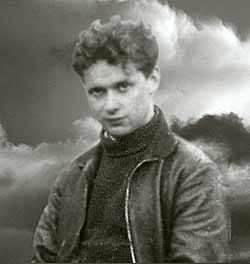the best poetry
Hallelujah: A Sestina
A wind's word, the Hebrew Hallelujah.
I wonder they never gave it to a boy
(Hal for short) boy with wind-wild hair.
It means Praise God, as well it should since praise
Is what God's for. Why didn't they call my father
Hallelujah instead of Ebenezer?
Eben, of course, but christened Ebenezer,
Product of Nova Scotia (hallelujah).
Daniel, a country doctor, was his father
And my father his tenth and final boy.
A baby and last, he had a baby's praise:
Red petticoats, red cheeks, and crow-black hair.
A boy has little to say about his hair
And little about a name like Ebenezer
Except that you can shorten either. Praise
God for that, for that shout Hallelujah.
Shout Hallelujah for everything a boy
Can be that is not his father or grandfather.
But then, before you know it, he is a father
Too and passing on his brand of hair
To one more perfectly defenseless boy,
Dubbing him John or James or Ebenezer
But never, so far as I know, Hallelujah,
As if God didn't need quite that much praise.
But what I'm coming to - Could I ever praise
My father half enough for being a father
Who let me be myself? Sing Hallelujah.
Preacher he was with a prophet's head of hair
And what but a prophet's name was Ebenezer,
However little I guessed it as a boy?
Outlandish names of course are never a boy's
Choice. And it takes some time to learn to praise.
Stone of Help is the meaning of Ebenezer.
Stone of Help - what fitter name for my father?
Always the Stone of Help however his hair
Might graduate from black to Hallelujah.
Such is the old drama of boy and father.
Praise from a grayhead now with thinning hair.
Sing Ebenezer, Robert, sing Hallelujah!
-Robert Francis
One Art
The art of losing isn't hard to master;
so many things seem filled with the intent
to be lost that their loss is no disaster.
Lose something every day. Accept the fluster
of lost door keys, the hour badly spent.
The art of losing isn't hard to master.
Then practice losing farther, losing faster:
places, and names, and where it was you meant
to travel. None of these will bring disaster.
I lost my mother's watch. And look! my last, or
next-to-last, of three loved houses went.
The art of losing isn't hard to master.
I lost two cities, lovely ones. And, vaster,
some realms I owned, two rivers, a continent.
I miss them, but it wasn't a disaster.
— Even losing you (the joking voice, a gesture
I love) I shan't have lied. It's evident
the art of losing's not too hard to master
though it may look like (Write it!) like disaster.
 — Elizabeth Bishop
— Elizabeth BishopI
We are the hollow men
We are the stuffed menLeaning together
Headpiece filled with straw. Alas!
Our dried voices, when
We whisper together
Are quiet and meaningless
As wind in dry grass
Or rats' feet over broken glassI
n our dry cellar
Shape without form, shade without colour,
Paralysed force, gesture without motion;
Those who have crossed
With direct eyes, to death's other Kingdom
Remember us -- if at all -- not as lost
Violent souls, but only
As the hollow men
The stuffed men.
II
Eyes I dare not meet in dreams
In death's dream kingdom
These do not appear:
There, the eyes are
Sunlight on a broken column
There, is a tree swinging
And voices are
In the wind's singing
More distant and more solemn
Than a fading star.
Let me be no nearer
In death's dream kingdom
Let me also wear
Such deliberate disguises
Rat's coat, crowskin, crossed staves
In a field
Behaving as the wind behaves
No nearer --
Not that final meetingIn the twilight kingdom
III
This is the dead land
This is cactus land
Here the stone images
Are raised, here they receive
The supplication of a dead man's hand
Under the twinkle of a fading star.
Is it like this
In death's other kingdom
Waking alone
At the hour when we are
Trembling with tenderness
Lips that would kiss
Form prayers to broken stone.
IV
The eyes are not here
There are no eyes here
In this valley of dying stars
In this hollow valley
This broken jaw of our lost kingdoms
In this last of meeting places
We grope together
And avoid speech
Gathered on this beach of the tumid river
Sightless, unless
The eyes reappear
As the perpetual star
Multifoliate rose
Of death's twilight kingdom
The hope only
Of empty men.
V
Here we go round the prickly pear
Prickly pear prickly pear
Here we go round the prickly pear
At five o'clock in the morning.
Between the idea
And the reality
Between the motion
And the act
Falls the Shadow For Thine is the Kingdom
Between the conception
And the creation
Between the emotion
And the response
Falls the Shadow Life is very long
Between the desire
And the spasm
Between the potency
And the existence
Between the essence
And the descent
Falls the Shadow For Thine is the Kingdom
For Thine is
Life is
For Thine is the
This is the way the world ends
This is the way the world ends
This is the way the world ends
Not with a bang but a whimper.

-TS Elliot
Do not go gentle into that good night,
Old age should burn and rave at close of day;
Rage, rage against the dying of the light.
Though wise men at their end know dark is right,
Because their words had forked no lightning they
Do not go gentle into that good night.
Good men, the last wave by, crying how bright
Their frail deeds might have danced in a green bay,
Rage, rage against the dying of the light.
Wild men who caught and sang the sun in flight,
And learn, too late, they grieved it on its way,
Do not go gentle into that good night.
Grave men, near death, who see with blinding sight
Blind eyes could blaze like meteors and be gay,
Rage, rage against the dying of the light.
And you, my father, there on the sad height,
Curse, bless me now with your fierce tears, I pray.
Do not go gentle into that good night.
Rage, rage against the dying of the light.
 -Dylan Thomas
-Dylan Thomas
0 Comments:
Post a Comment
<< Home